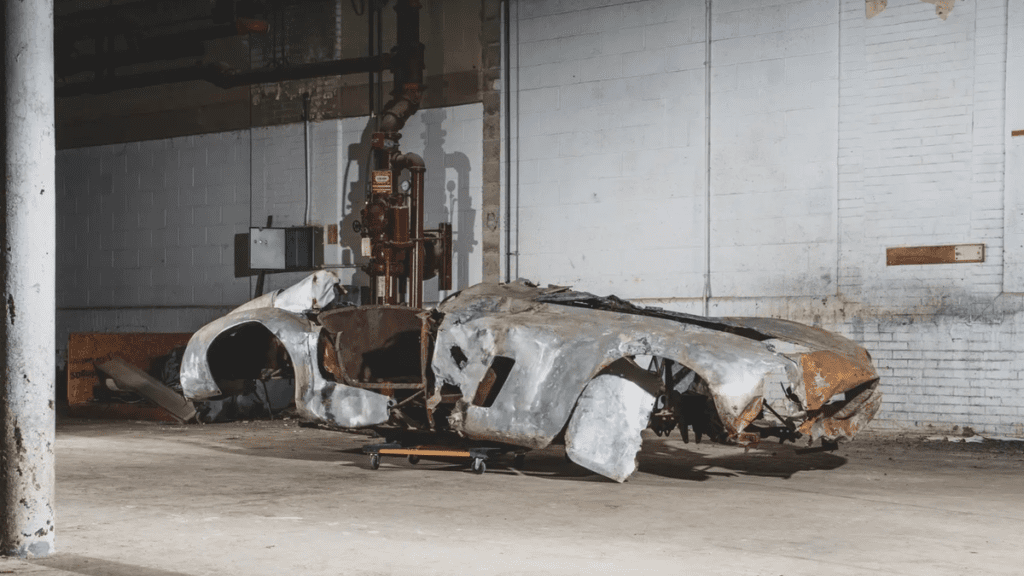It Will Take Another $2 Million To Get This $1.9 Million Wrecked Ferrari Back On The Road

Another Monterey Week is in the books, with high-end auctioned autos going home to new owners. One in particular caught the eye of attendees, this incredibly rare, and incredibly wrecked, 1954 Ferrari 500 Mondial Spider Series I which sold for $1,875,000.
The Little Car Company Makes The Electric Junior Car Of Your Dreams
You may have guessed from the price for this burned out vehicle that it is very special, and you’d be right! This particular Ferrari is the second one ever built and was raced in 1954 by Ferrari driver Franco Cortese, according to the listing from RM Sotheby’s:
Claiming period racing use and initial ownership by one of Italy’s better-known Scuderia principals, this long-secluded 500 Mondial has the history to warrant a thoughtful restoration. Chassis number 0406 MD is sequentially just the second Mondial built, and one of 13 first-series examples originally bodied as Pinin Farina spiders.
According to the research of marque expert Marcel Massini, and as confirmed by copies of factory build sheets, this Ferrari was assembled during March 1954 and finished in Rosso Corsa paint over a Similpelle Beige vinyl interior. The following month the car was sold by Enzo Ferrari to Franco Cornacchia, the Milan-based sports car dealer who also helmed the Scuderia Guastalla, one of the region’s most significant privateer racing teams.
In April 1954 the Ferrari was piloted by former factory driver Franco Cortese and co-driver Perruchini at the Coppa della Toscana, finishing 19th overall and 2nd in class. It is interesting to note that Cortese is listed as the owner on the factory build sheets, and his name appears several times in the engineering notes, prompting speculation that the car was purchased by Cornacchia specifically for Cortese’s use.
Cortese was a particularly significant driver for Ferrari during its earliest years, boasting the distinction of piloting the first Ferrari built to the marque’s first overall victory. His win at the 1947 Rome Grand Prix in the new 125 S was an early indication of Maranello’s engineering mettle, and he managed to achieve three more wins during 1947 before easing out of the Ferrari stable by mid-1949.
In May 1954, Cortese and Perruchini drove the Mondial to a 4th in class and 14th overall finish at the Mille Miglia, after which the car was rebodied by Scaglietti. Cortese returned to action in late June, finishing 8th in the Golden Shell race at the Imola Grand Prix.
At the Imola Grand Prix in June 1955 Cornacchia entrusted the Mondial to Joao Rezende Dos Santos, by which time the car had been repainted in white with a tri-color stripe on the hood. Unfortunately, the spider retired during the formation lap, apparently experiencing some mechanical failure. Undeterred, Dos Santos returned with a vengeance at the Bolzano-Mendola hillclimb in early July, roaring to a 4th-place finish.
It’s quite a pedigree. In 1958 the Mondial was exported to the U.S., where it was raced by various owners before it crashed and burned sometime in the ’70s sometime after an American V8 was installed. But don’t worry, this Mondial comes with a 3.0-liter Tipo 119 Lampredi inline-four engine, the kind used on the 750.
But an engine is just the start of what you’d need to do to give this car the “thoughtful restoration” it so richly deserves. Insider spoke to a Ferrari restoration specialist about what it will take to bring the rusty, race-damaged Mondial back to life:
A full restoration, in this case, will almost certainly cost between $1.5 million to $2 million, Andreas Birner, a Ferrari broker and historian, told Insider in an email.
Birner wrote that a “legitimate reconstruction” of this Mondial, “with an almost completely new frame and an almost entirely new bodywork,” could likely only be done by Ferrari’s Classiche program, which restores and certifies old Ferraris.
“Only if it’s done by Ferrari on behalf (of) the new owner, the reconstructed car will be a legitimate car because it will have been resurrected by the manufacturer who once built it, not by some restoration shop in a different part of the world,” Birner wrote. “Ferrari Classiche will also be able to grant the reconstructed car their blessings by issuing a Ferrari Classiche certificate that explains which parts of the car are still original and which are new, but corresponding to the original specifications which were on the car when it left the factory in Maranello back in 1954.”
Naturally, the car would need to be shipped to Italy to be given the full Ferrari Classiche program shine. Meanwhile, restoration efforts could take more than a year to complete—and that’s if the program accepted a car that is basically a rusty body, rear-axle corners, the gearbox, and the factory license plate that reads “0406 MD.”
Even if the new owners leave the Mondial in its racing-damaged condition, they’ve certainly purchased themselves an amazing piece of Ferrari history.





